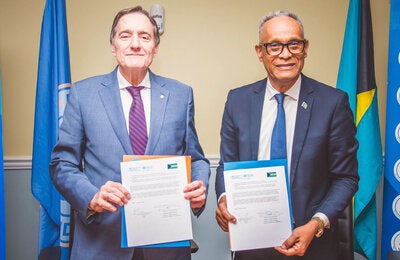

In a new public service announcement (PSA) launched today by the Pan American Health Organization/World Health Organization (PAHO/WHO), salsa and pop singer Jerry Rivera calls on men to openly denounce violence against women, a public health problem that affects more than half of women in some Latin American countries.
Bogotá, Colombia, 25 November 2011 (PAHO/WHO) — In a new public service announcement (PSA) launched today by the Pan American Health Organization/World Health Organization (PAHO/WHO), salsa and pop singer Jerry Rivera calls on men to openly denounce violence against women, a public health problem that affects more than half of women in some Latin American countries.
Rivera's message is being launched on the International Day for the Elimination of Violence against Women, Nov. 25. It is intended to counter sexist attitudes that equate masculinity with the use of violence and dominance over women. The singer urges men to speak out openly and express their opposition to such violence.
"As men, husbands, partners, fathers, brothers and friends, we can prevent violence against women. It is our responsibility," Rivera says in the PSA. "Talk to each other, share this message. Yes, we can change. Let's unite to end violence against women."
The new PSA is Rivera's second such collaboration with PAHO/WHO since 2006, when he was named a Champion of Health in the Americas by the Organization. Both collaborations form part of the Unite to Stop Violence against Women campaign launched by United Nations Secretary-General Ban Ki-moon in 2008.
Violence against women is a major public health problem throughout the world. In Latin America and the Caribbean, between 13 percent and over 50 percent of women report having suffered violence at the hands of an intimate partner, according to a PAHO/WHO study scheduled for release early next year. Between 10 percent and 27 percent say they have been victims of sexual violence at the hands of a partner or stranger, according to the same study.
Experts note that violence against women can have lethal consequences, including homicide, suicide, HIV infection, and higher risk of maternal mortality. Nonlethal consequences include injuries, chronic pain, depression and other mental disorders, high-risk sexual conduct, alcohol and drug abuse, HIV and other sexual infections, unplanned pregnancies, and unsafe abortions.
Children also suffer as a result of violence against women, both directly as co-victims and indirectly as witnesses, and they are at greater risk of becoming perpetuators of similar violence as adults. Other risk factors for being a perpetrator include low education, harmful use of alcohol, and attitudes that are accepting of violence and gender inequality. Most of these are also risk factors for becoming a victim of intimate partner or sexual violence.
Experts say it is important to involve men positively and proactively in preventing violence against women. The "Unite" campaign includes a Network of Men Leaders, formed by U.N. Secretary-General Ban Ki-moon, that works to counter destructive stereotypes, embrace equality, and inspire men and boys everywhere to speak out against violence.
Rivera's concerns about violence against women inspired the 2005 ballad Rivers of Pain, which he wrote and recorded with his sister, Saned. While the pair grew up together in a home free of violence, they say they know many who are not so fortunate, and that they feel obliged to speak out to try to prevent such violence.
"I am privileged to have been born to a mother who took really good care of me," says Jerry Rivera. "I have the best wife in the world, wonderful aunts, two daughters, so I am surrounded by women. I cannot get my head around the idea of abusing a woman."
Links



